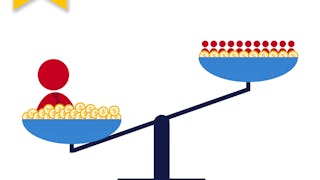This course is aimed at anyone who has interest in the lens through which mathematicians view democracy. You will learn theories and approaches to the mathematics of voting.



Empfohlene Erfahrung
Empfohlene Erfahrung
Was Sie lernen werden
Mathematics of voting
Theories of democracy
Kompetenzen, die Sie erwerben
- Kategorie: Game Theory
- Kategorie: Mathematical Modeling
- Kategorie: Probability
- Kategorie: Critical Thinking
- Kategorie: Statistical Analysis
- Kategorie: Applied Mathematics
- Kategorie: General Mathematics
- Kategorie: Political Sciences
- Kategorie: Social Sciences
- Kategorie: Combinatorics
Wichtige Details
4 Aufgaben
Erfahren Sie, wie Mitarbeiter führender Unternehmen gefragte Kompetenzen erwerben.

In diesem Kurs gibt es 4 Module
This module sets the stage for the entire Teach Out. We begin by discussing the nature of mathematics (as opposed to arithmetic) and develop a workable abstract model for democracy: a function that takes individual preferences and returns a group decision. We then look closely at different methods for two-party elections, fairness criteria we want these functions to have, and conclude that only the Simple Majority method satisfies those criteria.
Das ist alles enthalten
6 Videos1 Lektüre1 Aufgabe2 Diskussionsthemen
This module builds on the work from Module 1 by considering elections with three (or more) candidates. We examine various decision functions (such as Plurality and Borda Counts) as well as properties we want those functions to have. We conclude with Arrow’s Theorem that shows that there are no decision functions satisfying basic fairness criteria.
Das ist alles enthalten
7 Videos1 Lektüre1 Aufgabe2 Diskussionsthemen
In the previous modules we assumed that each voter ranks the candidates from most to least desirable; these individual rankings are the inputs to the decision functions. In this module we question the viability of asking voters to rank both for psychological reasons (it is very difficult to rank a long list of options) and—more to the point of this Teach Out—for mathematical reasons. We model preference using a simple game played with dice that illustrates non-transitive preference: A is better than B, B is better than C, but C is better than A!
Das ist alles enthalten
3 Videos1 Lektüre1 Aufgabe1 Diskussionsthema
This module considers mathematical issues arising in representative democracy in which elected officials make decisions for the larger population. In the United States House of Representatives, the number of representatives from a given state is proportional to the population of that state. However, since the number of representatives from a state must be a whole number, and the total number of representatives is 435, we need a method by which seats are allocated to states. We present the apportionment methods of Hamilton and Jefferson, and discuss problems arising with these methods. We conclude with a theorem of Balinsky and Young that shows there are no apportionment methods satisfying basic fairness conditions.
Das ist alles enthalten
7 Videos3 Lektüren1 Aufgabe1 Diskussionsthema
Erwerben Sie ein Karrierezertifikat.
Fügen Sie dieses Zeugnis Ihrem LinkedIn-Profil, Lebenslauf oder CV hinzu. Teilen Sie sie in Social Media und in Ihrer Leistungsbeurteilung.
Dozent

Mehr von Math and Logic entdecken


Johns Hopkins University
 Status: Vorschau
Status: Vorschau
Utrecht University
 Status: Kostenloser Testzeitraum
Status: Kostenloser Testzeitraum
Johns Hopkins University
 Status: Vorschau
Status: Vorschau
Duke University
Warum entscheiden sich Menschen für Coursera für ihre Karriere?





Neue Karrieremöglichkeiten mit Coursera Plus
Unbegrenzter Zugang zu 10,000+ Weltklasse-Kursen, praktischen Projekten und berufsqualifizierenden Zertifikatsprogrammen - alles in Ihrem Abonnement enthalten
Bringen Sie Ihre Karriere mit einem Online-Abschluss voran.
Erwerben Sie einen Abschluss von erstklassigen Universitäten – 100 % online
Schließen Sie sich mehr als 3.400 Unternehmen in aller Welt an, die sich für Coursera for Business entschieden haben.
Schulen Sie Ihre Mitarbeiter*innen, um sich in der digitalen Wirtschaft zu behaupten.
Häufig gestellte Fragen
Access to lectures and assignments depends on your type of enrollment. If you take a course in audit mode, you will be able to see most course materials for free. To access graded assignments and to earn a Certificate, you will need to purchase the Certificate experience, during or after your audit. If you don't see the audit option:
The course may not offer an audit option. You can try a Free Trial instead, or apply for Financial Aid.
The course may offer 'Full Course, No Certificate' instead. This option lets you see all course materials, submit required assessments, and get a final grade. This also means that you will not be able to purchase a Certificate experience.

